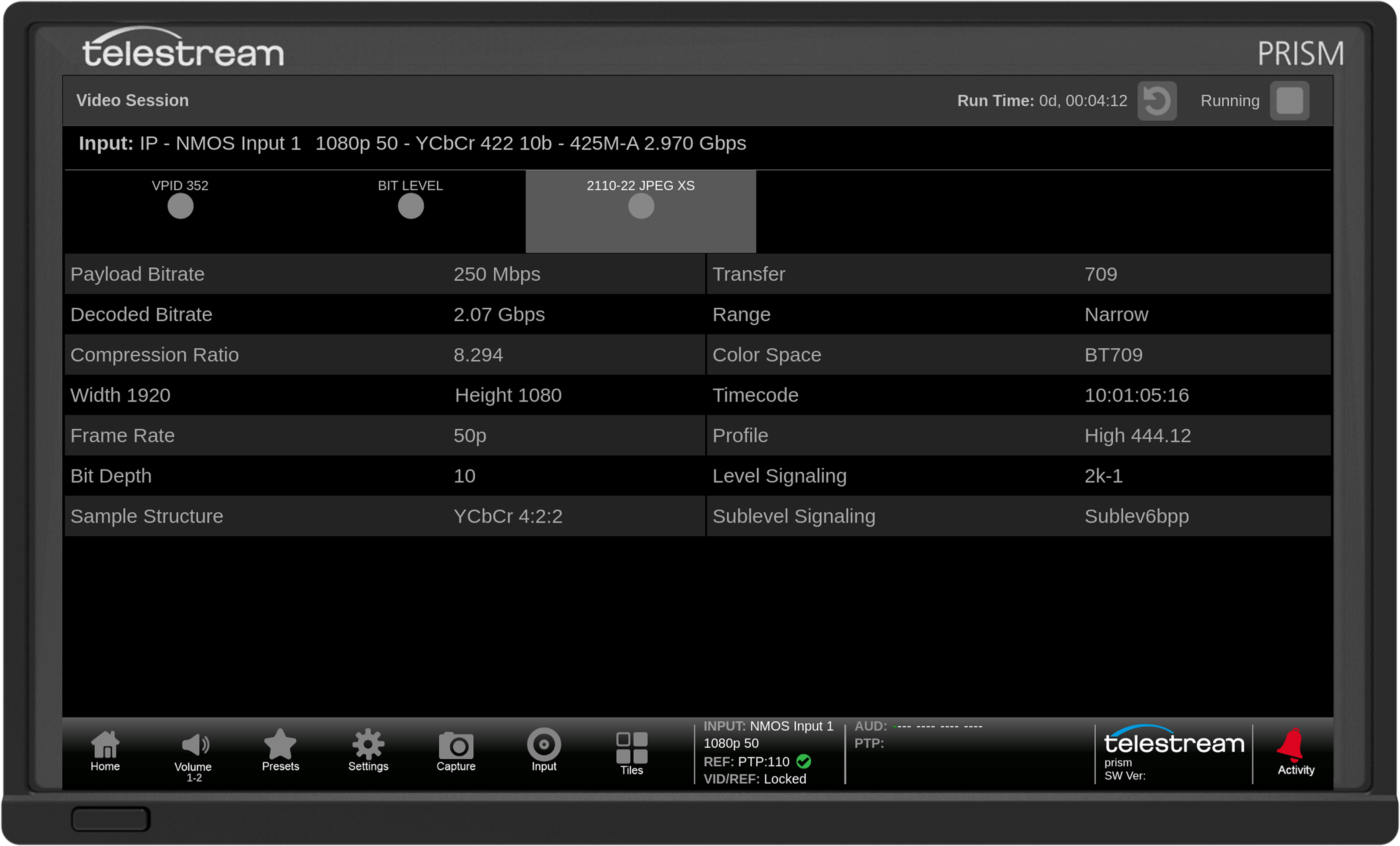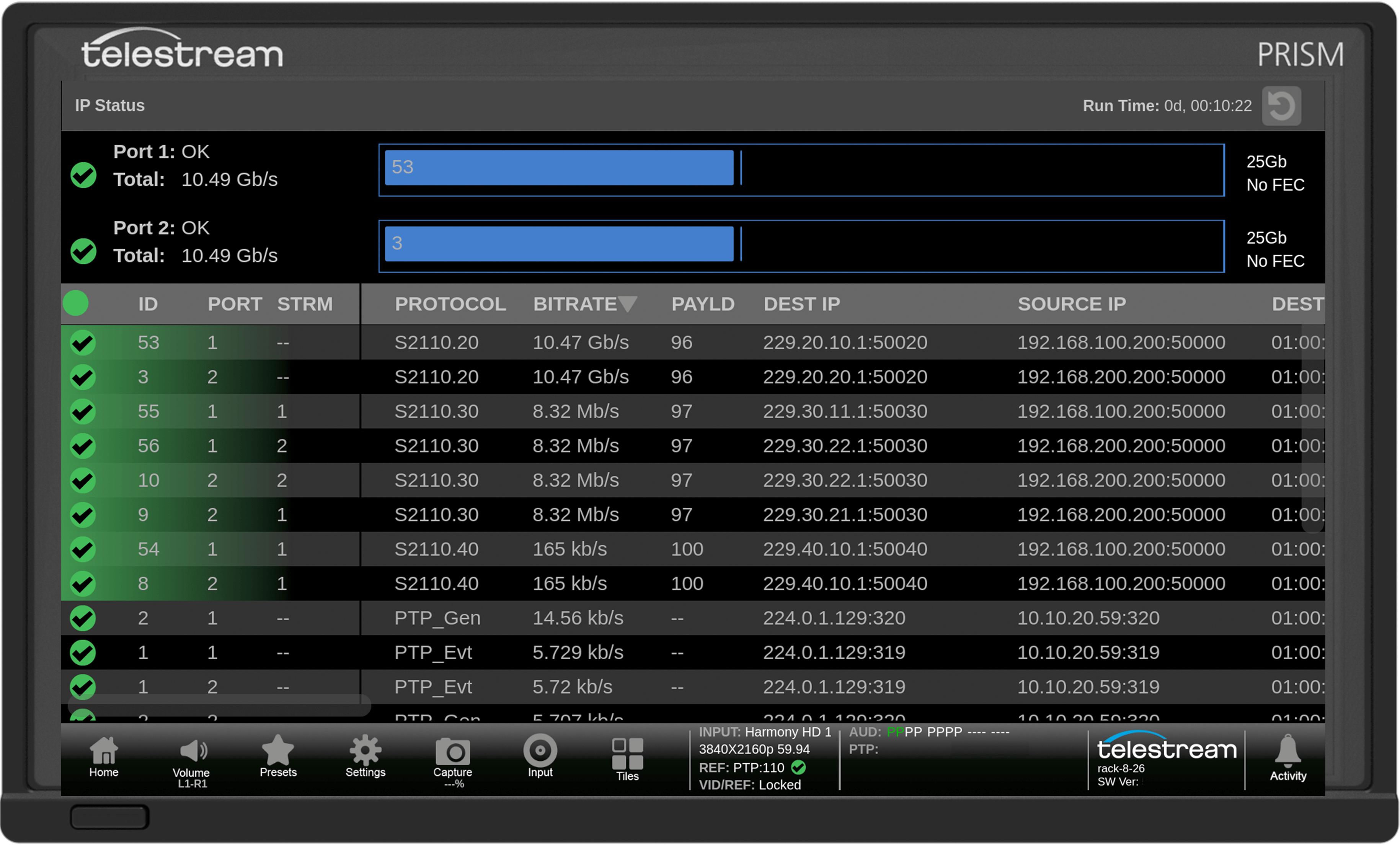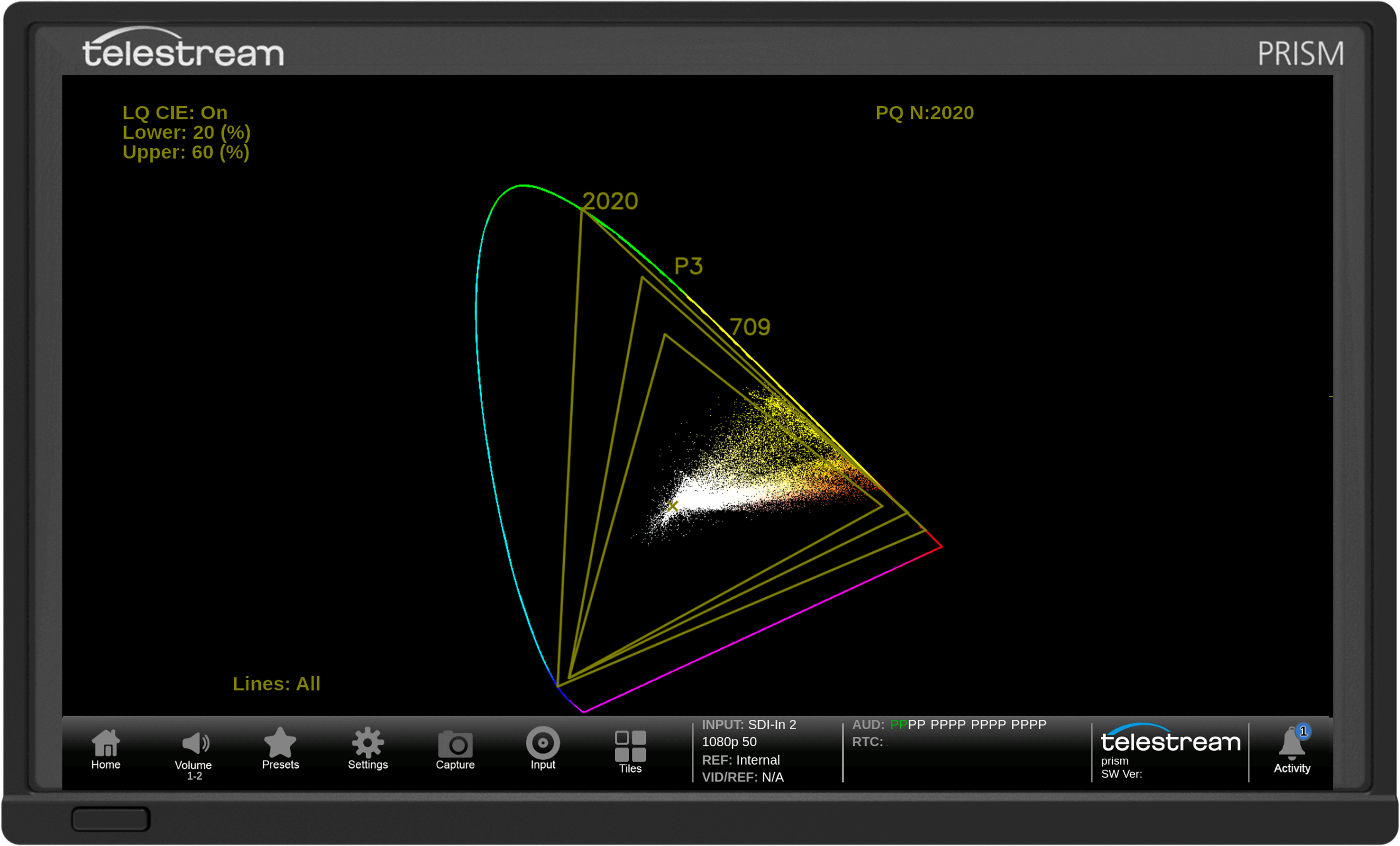In the competitive media and entertainment industry, success relies on superior content and quality delivery. The PRISM family helps ensure both, through tools that meet the required diagnostic and analysis needs. Whether you need an instrument for engineering, the creative team, or both, PRISM delivers:




Click on an icon to find out more about the Apps.

Provides an array of configurations for various display of YPbPr, YRGB or RGB with a variety of Gain, Sweep, Mag and Line Select functions and the ability to add cursors for precise measurement within the trace.

Allows the user to adjust the Saturation and Hue of the color components with adjustment of Gain, Line Select or bar format (100% / 75%).

An X-Y plot of Luma versus Pb in the upper trace and negative Luma versus Pr in the lower trace for easy identification of the component. Provides inter-channel timing of the YPbPr components and simple adjustment of the black level using Gain and MAG.

Provides an X-Y Plot of G versus B in upper trace and G versus R in lower trace for easy identification or RGB components. Used by Camera Shaders and Colorist for simple adjustment of the RGB signal.

Shows a decoded image of the currently selected input. For visual identification of the image and to aid in troubleshooting issues.

Provides a summary of the SDI Format with SDI VPID SMPTE ST352, Bit Level and CRC Status. For IP streams provides summary of Format with VPID SMPTE ST352, Bit Level and ST 2110-22 JPEG XS when decoded with option JPXS.

For the selected input audio levels can be show for each audio channel with in-bar indication for such events as over, clip, mute and silence. With configurable ballistics for True Peak, PPM1 and PPM2.

Shows a list of alarm events related to Source and Time the event occurred relative to internal time or derived from the input Timecode or PTP Time.

Show the input timing relative to the reference of Black Burst, Tri-Level or PTP (Requires option IP-MEAS) and allows the user to make simple timing adjustments to ensure synchronization within the facility.

When an analog reference is connected to the rear of the instrument this display will show the waveform trace of NTSC, PAL or Tri-Level Sync signal with a variety of Gain Sweep and Mag controls.

For IP signals provides a summary of Protocol, Bitrate, Payload Type, IP/MAC addresses, PTP Domain, Sequence Error, RTP Clock and RTP Marker Frequency for either SFP ports.

IP Session provides a summary of information for the decoded stream. With information on Layer 1 and 2. Along with syntax information on the video, audio and data streams. Summary information is provided on PTP and NMOS applications to assist the user in diagnosing problems. Requires option IP-MEAS to be installed in the instrument.

PIT Histogram provides a graphical plot of the packet arrival times of the signal being decoded for video, audio and data. The characteristic signature of the Histogram can be used to diagnose the type of Sender and help determine issues with network congestion. Requires option IP-MEAS to be installed in the instrument.

IP graphs provides graphical plots of parameter such as Total Bit Rate, Session Bit Rate, PIT arrival time and RTP Sequence Errors. These graphs can be plotted from the last 60 seconds to twenty-four hours. Allow users to see trending information of their decoded streams over time. Requires option IP-MEAS to be installed in the instrument.

Provides graphical plots of the timing for ST 2110 video, audio and data. Comparing the data as it was received by PRISM relative to the embedded RTP time stamps and PTP. Stream Timing can be used to check the synchronization of each sender to PTP for the various flows. Requires option IP-MEAS to be installed in the instrument.

Trending graphs of various performance parameters of the PTP signal can be plotted from 60 seconds to 24 hours. Allowing users to track the stability of PTP within the network. Requires option IP-MEAS to be installed in the instrument.

Video data is plotted as either a 1931 or 1976 CIE diagram. This display can be used to check the chromaticity of the video signal and determine compliance to specific gamut limits such as BT.2020, DCI-P3 or Rec 709. With Luma Qualified CIE the user can define a luma range that constrains the display. Requires option PROD to be installed in the instrument

The Telestream Stop Display provides a tool to monitor the video signal with a variety of transfer functions in a consistent manner. This simplifies monitor of camera raw and High Dynamic Range (HDR) content to provide a consistent look. Stop Display also supports 3D LUT-based conversions using a single HDR feed. Requires option PROD to be installed in the instrument.

Camera Alignment Monitoring allows the user to monitor up to four SDI waveform inputs simultaneously. This is ideal for camera balance and shading applications allowing the user to compare levels across the various inputs in YRGB parade. A thumbnail and input identification are also available in this mode. Requires option MULTI to be installed.

This display shows the Dolby Metadata present within the Dolby signal or present within an ANC Packet as standardized in SMPTE ST 2020. The AUD option is required and if the user want to decode the Dolby signal option DLBY is required.

AES Channel Status display provides information on the audio signals Channel Status bits. When the Channel Use mode is shown as Profession the syntax can be automatically decoded. The AUD option is required for this application.

Datalist display can be used to view the samples of the SDI signals. The user can search through the data for Start of Active Video (SAV) or End of Active Video (EAV) or the next ANC Data packet. Option ENG-QC is required for this application.

ANC Session provides a watchlist of the available Ancillary Data types present within the signal and provides information on DID, SDID, Link, location and occurrence of the packets. With decode of SCTE 104 messaging. Option ENG-QC is required for this application.

The Eye Display provides a measurement of the SDI physical layer for Timing and Alignment with automated measurements. The Eye Display feature is available in MPS300, MPD300, and MPP300 as standard. Option FMT-4K to enable the support for 6G and 12G SDI.

The Jitter Display can be used in conjunction with the Eye display to measure the physical layer of the SDI signal. The Jitter Display feature is available in MPS300, MPD300, and MPP300 as standard. Option FMT-4K to enable the support for 6G and 12G SDI.

The Audio to Video Delay measurement measures the presentation time difference of Audio and Video using the AV Timing mode test signal (Flash & Pop) generated by the Telestream Sync Pulse Generator products. The user can measure lip sync timing of PCM / Dolby over SDI, ST 2110 and ST 2022-6 signals. Option ENG-QC is required for this application.

IP Generator provides a simple test pattern generator for ST 2110 for color bars and audio tones. Requires GEN option.
IP Display outputs ST2110-20 stream of PRISM UI image. PRISM MPD models and units in EXTNDSP mode output two ST 2110-20 streams to transmit both left and right display images

SDI Generator provides a simple test pattern generator with color bar test signal. Requires GEN option.
PRISM is designed to be used in multiple applications from HD-SDI Live Acquisition to 25G ST 2110 IP Engineering and diagnostics. Software modules Options can be added any time to customize the instrument to meet the needs of job at hand.
The software based UI can then be personalized to meet the needs of the individuals on the team and how they like to work. These configurations can be stored as presets for quick instrument setup when needed.
With multiple ways to mount and install the instrument and multiple ways to interact with, and control the instrument, PRISM fits comfortably into any environment.
Flexible tile configurations provide full screen, two, three and four tile layouts giving flexibility in selecting a variety of software apps for your specific application while still allow easy viewing of each display. Each layout can be customized for each user and assigned as a preset.

With Dual screen displays each display can be configured the same way you can configure a single screen instrument providing an abundance of ways to personalize the user experience. Your layout can go from two full tiles to a total of eight quarter tile display applications and anything in between.

With the MULTI option operators can easily compare different input channels using various formats SDI, IP ST2110 and ST 2110-22 (JPEG-XS). Using the wide variety of Apps within PRISM that can be tailored to meet your applications. With the JPEG XS license, PRISM supports up to 4 simultaneous ST2110-22 streams that can be decoded, ideal for remote production where compressed UHD camera feeds are monitored at the facility. These various configurations can be saved as presets for easy recall and gives operators and engineers the ability to customize multiple inputs and applications to suit their needs from camera shading to color correcting with HDR and SDR content.

Engineering and production staff increasingly need to work remotely, and PRISM can be controlled via webRTC or noVNC using the same UI that can be accessed from the front panel. Providing the user with fully featured access to the monitoring and measurement applications available within PRISM.
WebRTC offers the ability to stream the display via a Chrome web browser for real-time update of the displays and ability to listen to audio of the selected channels, Recordings can be made from the browser and saved to your local PC for help review or troubleshooting issues.
Remotely configure and export presets, download the event log and use Syslog for remote analysis of events and alarms.
Managing exposure is key to the creation of great content. PRISM provides a mix of traditional and new tools such as False Color Displays, STOP waveform, Lightmeter and User configurable 3D LUTs for managing S-Log 2, S-Log 3, Log-C, HLG and PQ gamma curves to enable objective level and luminance area measurements to ensure consistency.
The combination of high resolution, wide color gamut and high dynamic range can bring the image to life.
PRISM provides all the tools needed to balance your camera, check color consistency and master in multiple color spaces. The Vector and Luma Qualified CIE chart displays provide adjustment of color for Rec. 709 and 2020 color spaces. The Telestream Diamond display simplifies adjustment of the R/G/B components.
The Luma Qualified CIE charts ensure compliance for Rec. 709, 2020 and DCI P3 with Banded False Color Gamut overlays in the picture display make it easy to identify colors that are outside the DCI-P3 or Rec.709 color space.
PRISM provides a set of audio monitoring tools for embedded audio and ST 2110-30 or -31. Including configurable audio bars, Loudness measurement, Surround Sound, Lissajous phase, and Audio Session displays, for monitoring multi-channel 5.1, 7.1 and 7.1.4 mixes with Dolby Digital and E decoding. Dolby ED2 is supported for Metadata display in Dolby Status. Display up to 32 Channels of audio for 8K/4K productions.
Listen to the selected audio channels or downmixed stereo channels via headphones.
For post-production applications the MPP200/300 offer eight channel analog audio outputs for de-embedding audio from SDI and IP streams or by decoding Dolby D/E to 5.1 or 7.1 outputs.


MPP300 front and rear panels

The MPS, MPD and MPP 100 series offer SDI only configurations of the PRISM family of waveform monitors. Offering a range of tools to suite a variety of monitoring applications with four SDI inputs that support from SD-SDI to 8K. With the ability to monitor HDR and SDR using waveform and STOP displays. Supporting 709 and 2020 color spaces with traditional vector and CIE displays. For monitoring of SDI embedded audio. The 100 series offers audio levels, Lissajous, loudness monitoring and RTW surround display. The variety of software applications can be tailored to suit your application from camera balance to post-productions or network operations.
Ensuring continued operation of equipment within the facility or network is critical to maintaining a high quality. The Telestream PRISM provides and extensive set of tools to aid in troubleshooting problems and diagnosing issues. For SDI a 12G Eye display can be used to check on the health of transmission of the signal.
With the Datalist and ANC Session allowing investigation of metadata issues to ensure SCTE104, Closed Captions and AFD are present within the signal and being decoded correctly.
For validation of Lip Sync issues AV Delay measures the timing difference between audio to video using a simple flash pop sequence generated by the Telestream SPG and provides a measurement of advance or delay for up to 16 channels.
The transition to IP needs a comprehensive tool set to provide visibility of your Audio, Video and Data streams throughout the network.
PRISM provides 10GE support for ST 2022-6, ST 2022-7 and ST 2110 as standard with simple software upgrade to 25GE connectivity. Straightforward monitoring of IP streams with measurement applications to help characterize network performance and troubleshoot issues. With MULTI input support the user can compare the IP and SDI formats across the facility. With support of ST2110-22 (JPEG XS) user can send low latency compressed streams, saving bandwidth within the IP Media infrastructure.

See the bigger picture of what is happening across the whole of the network 24/7 and respond to issues quickly and decisively. PRISM and the Telestream INSPECT work in conjunction to provide large scale monitoring by exception, network visibility and deep content and stream diagnostics at the click of a button. The complete Engineering and Operations solution all from one company that can grow as your network grows.
Live production is a high-pressure environment for Video Shaders and the Engineer in Charge. They need the right tools to help them setup the OB Truck quickly and reliably. Once the event starts the Shaders need easy to use instruments and easy to understand displays to allow them to make camera adjustment decisions quickly and accurately regardless of whether it is an HDR or an SDR production.
Customizable UI’s, managed presets and specialist tools for exposure and color makes PRISM the ideal tool for this environment. Manage exposure multiple ways using the waveform, false color picture display, Stop display and Lightmeters. Manage color using the vector display, diamond display, CIE chart, and false color picture display for gamut. With MULTI options users can monitor up to four SDI or IP inputs simultaneously to make comparisons of multiple cameras or compare SDR to HDR content. Additionally Tally/UMD (Under Monitor Displays) support on PRISM allows source label information and channel indication to be shown in picture.
PRISM provides all the tools that the Shading team would expect and more.


Quickly delivering high-quality content is critical to success as a Post Production professional. Editors and colorists need trusted, easy-to-use, tools to help accurately adjust exposure levels, manage looks, match color and exposure between scenes, and much more.
PRISM provides an array of both unique and traditional tools to manage exposure and color. These include Stop displays for easily measuring signal levels on the same scale you manage light levels; CIE charts with easy-to-read Rec.709, DCI P3, and Rec.2020 limit indicators; customizable false color image overlays to easily identify exposure and color gamut anomalies; and colored RGB Parade display, and traditional waveform and vector displays. These tools are wrapped in a proven UI, with usability features like a large floating timecode display and easy-to-read AFD / safe area / center graticules, that can be personalized to let you work the way your team and workflows need it to work.
For applications beyond the needs of broadcast television, PRISM supports DCI 2048x1080, 4096x2160 4K sources. The growing list of formats includes 10 or 12bit RGB via SDI at frame rates of 23, 24, 25, 29, and 30p; and 10bit YCbCr via ST 2110-20 at 23, 24, 25, 29, 30, 50, 59, and 60p, among others.
The PRISM preset system; event log; and audio, video, and data toolsets make technical QC and mastering a structured and repeatable process. Get it done right, first time, every time.
In the fast-paced production of live sports and events, operators need to make quick adjustment of camera controls. This is done to produce a consistent look across the multiple cameras at the event. Changing lighting conditions and various camera angles within a live production can make it challenging.
The PRISM CAM app allows for operators to monitor up to four SDI inputs simultaneously and view waveforms in Y or RGB or YRGB across all the selected inputs, with the ability to show thumbnail pictures and format labels to help identify each signal. By parading the multiple inputs in one display, the operator can easily compare the video levels of each camera and make adjustment to ensure each camera is matched.
The CAM display is available as part of the MULTI option within PRISM. That also allows support for up to four input that can be a mix of SDI and IP formats. Tally/UMD support provides information to the operator with source labels and current state of the input in Red, Amber or Green.


Broadcasters are responsible for ensuring that their content meets regulatory compliance requirements. PRISM provides a complete toolset for Technical QC and compliance checking.
Closed Captions support for CEA-608/708 ARIB STD-B37 and World Standard Teletext (WST) with decode of subtitle pages using OP47/ST2031 Ancillary data SCTE104 data can be monitored in ANC Session and logged in Event Log. Adjust Test level and Program peak level in Audio bar display to monitor audio level with facility standard.
Loudness monitoring that supports EBU R128:2014, ATSC A/85:2013 and BS.1770-2.
Gamut monitoring that supports EBU R103-3 (2020).